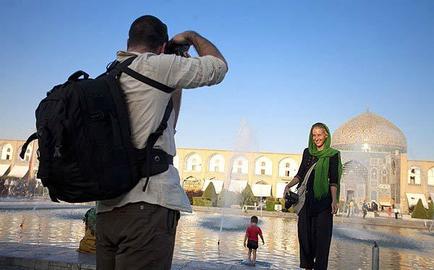Iran’s nuclear program is a matter of national pride and international prestige, says Pupak Mohebali.
Iran’s national identity has made its leaders determined to be a nuclear power. For them, being a nuclear power under the aegis of an Islamic Shiite regime would bring them prestige and power. Iran has invested significant resources of time, manpower and money to acquire nuclear capability at an enormous cost to the nation — at a time when the country has suffered from crippling economic sanctions and barriers to international trading.
Whether it is a hawkish leader (Mahmoud Ahmadinejad) or a smiling one (Hassan Rouhani), Iran’s presidents have sought to strengthen national identity and combat external through the nuclear program .
A range of different elements shape Iran’s nationalism, which in turn shapes Iran’s foreign policy decisions. First, there is Iran’s fear of external manipulation. Although Iran has never been colonized, world powers have intervened in its internal affairs. This experience shapes Iran’s politics of resistance. A second factor is Iran’s lack of any strategic ally in the region. Iran’s nuclear program is a symbol of its power status in the region. Resisting the West's efforts to limit Iran’s endeavor to be a nuclear power has turned into a matter of national pride and respect.
Iran’s ambition for pursuing its nuclear program originates from a serious geopolitical competition for predominance in the Middle East. The national discourse is extremely influenced by the political elite, and this discourse drives both policies and public speeches. The political elite has also used the nuclear issue to legitimatize its activities in other domestic areas.
Following the Islamic Revolution of 1979, leaders have used Iran’s nuclear policy to strengthen and empower the regime in Iran. But to ensure this goal is reached, the regime also needs the support of Iranian society. To this end, it has adopted a policy of tying the nuclear program to national identity and sovereignty, stressing its importance as a national asset and a symbol of national authority.
During his presidency, Mahmoud Ahmadinejad focused on Iran’s right to develop enriched uranium. Society was encouraged to support the government and its defense of the country’s inalienable right to acquire nuclear technology. To gain the support of religious groups and clerics in Iran, as well as the support of certain sections of society including often influential bazaaris, the Iranian regime adopted an Islamic policy and emphasized how this policy empowered Muslims.
State media have had a very effective role in ensuring the concept of identity is always interwoven into the nuclear program narrative. For many Iranians, Iran’s nuclear program has become a sacred value — and sacred values transcend any rational cost-benefit analysis. And, by their very nature, sacred values cannot be equated with anything material.
Iranian leaders, like leaders of other Muslim countries, believe that Islam is superior to other religions, and they aim to spread their religious ideas to the world. They use the tribunes of Friday prayer — often a forum for religious people, bazaaris and political hardliners to discuss their own ideas about Iran’s nuclear capability. They use Friday prayer imams to gain the support of the traditional and religious classes of Iranian society. For example, Ayatollah Ahmad Khatami, who temporarily served as Tehran’s Friday prayer leader, backed the country’s nuclear negotiators, referring to them as “the children of the nation”. Khatami also recommended that Iran’s youth, as well as analysts and experts, kept themselves updated on political issues and take a moderate position regarding the ongoing nuclear talks.
So to understand the country’s nuclear program, one must understand Iran’s national identity. Pursuing nuclear ambitions is not only crucial for the balance of power and for military purposes, it is the symbol of national and international prestige and of modernity. On the other hand Persian identity has been seen as a taboo ever since the Islamic revolution. Most countries oppose the development of nuclear weapons and view it as a “nuclear taboo.” They want to ensure nuclear weapons are never used, based on a belief that it would be wrong to do so. The opposite of the ‘nuclear taboo’ is the ‘nuclear myth’ — again, attaching symbolic meanings around statehood and prestige to nuclear capability.
Iranian leaders believe that the development of nuclear weapons is against Islamic law, and thus against Iran’s identity. Officials always say Iran’s nuclear program is peaceful, and support this claim by pointing to a fatwa issued by the Supreme Leader Ayatollah Khamenei forbidding the development of nuclear weapons. However, they also regard this peaceful nuclear technology as a symbol of their identity and prestige. Apart from acting as deterrent, the common sentiment is that, as a great civilization with a long history, Iran has the privilege to acquire peaceful nuclear capability. Iran’s nuclear program is to a great extent guided by the normative values attached to nuclear technology. This normative predisposition can vary among different countries or change over time, affecting a country’s nuclear policy.
Those people who want Iran to achieve a prominent status in the international community define their opinions on national policy based on their shared values, their history, their cultural perception and, in general, on how they wish to be seen in the world. While a country’s desire for prestige, respect and dignity influences decisions at the governmental level, one cannot ignore the effect geopolitics has on strategic interests.
The effectiveness of the Iranian nuclear negotiations has been a controversial topic for more than a decade. Central to this is the fact that when we look into the negotiation process, we mostly encounter the names of countries, organizations or institutions. The focus is less on the impact of elite ideologies and perceptions. But this focus would improve the negotiators’ mutual understanding of one another. As we have observed in the history of Iranian nuclear negotiations, individuals have an equal and crucial role in either making peace or provoking conflict.
The success of the last round of negotiations between Iran and P5+1 countries was about individuals. Iran’s Foreign Minister Mohammad Javad Zarif and his US counterpart John Kerry are now being regarded as possible candidates for the 2016 Nobel Peace Prize.
Related articles:
“The Idea that Iran is an Existential Threat to Israel is Nonsense”
"Israel needs to stop being so negative"
Hardliners: "Nuclear deal is a false victory"
To read more stories like this, sign up to our weekly email.
Originally published on July 27 2015
visit the accountability section
In this section of Iran Wire, you can contact the officials and launch your campaign for various problems




















comments